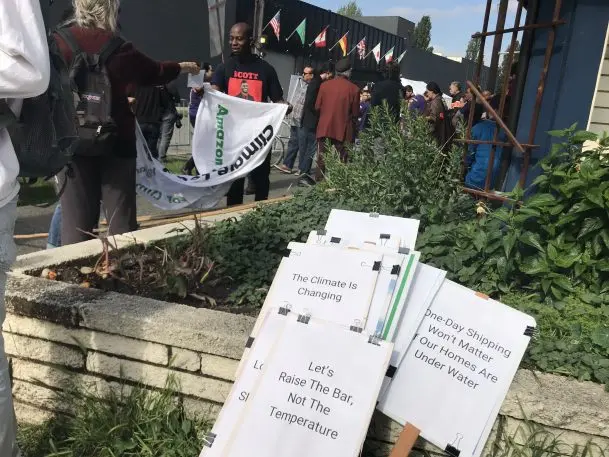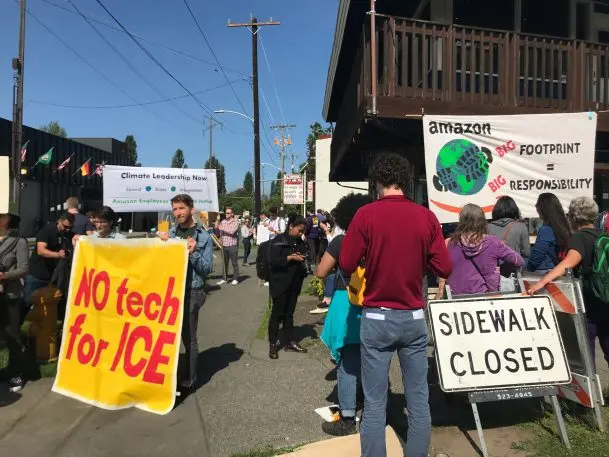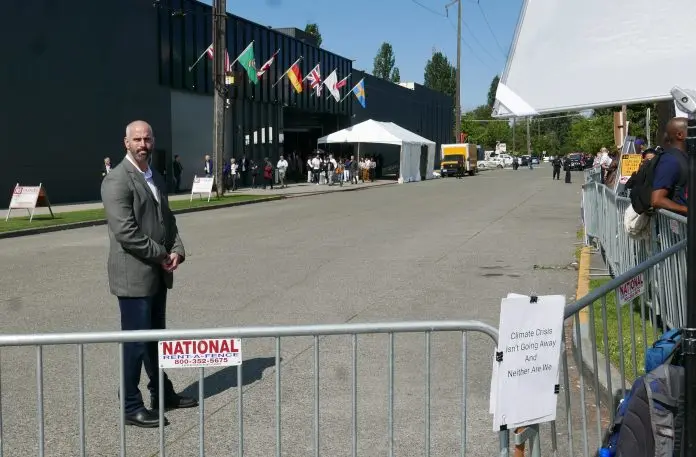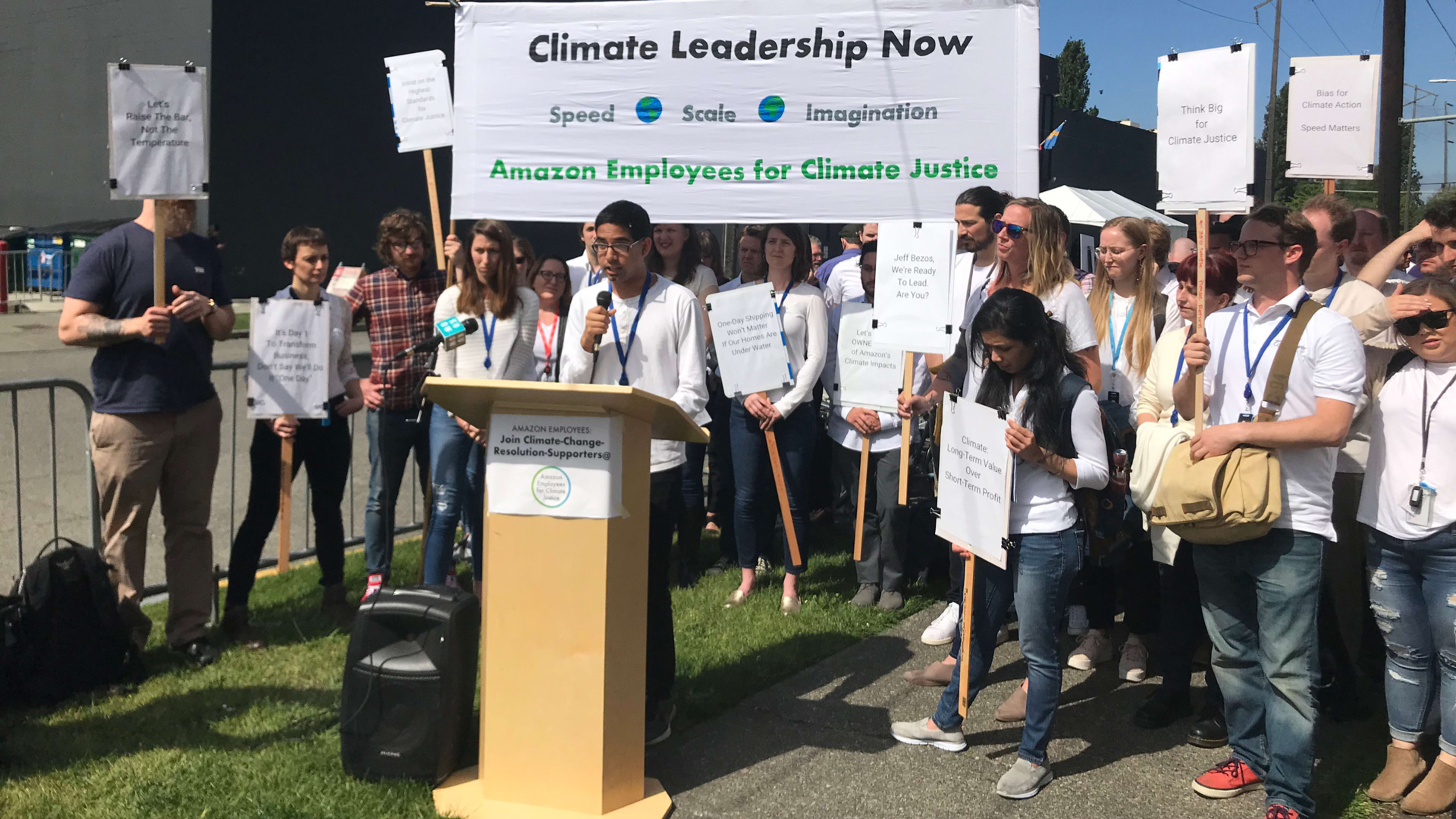“Speed is everything,” Emily Cunningham told Amazon’s annual shareholders meeting in Seattle on Wednesday. It sounded like a company motto or one of CEO Jeff Bezos’s famous leadership principles, but the veteran Amazon user experience designer was referring to a shareholder resolution, outlined in a letter signed by over 7,600 other employees, for the company to act on climate: Finally tally up its carbon emissions, make plans for climate-related events, and choose to make clearer, bigger commitments to stop producing planet-warming gases.
“Without bold, rapid action, we will lose our only chance to avoid catastrophic warming,” she said, her words aimed at her boss, the world’s richest man. “There is no issue more important to our customers, to our world than the climate crisis, and we are falling far short … Our home, planet Earth, not far-off places in space, desperately needs bold leadership. Jeff, all we need is your leadership.”
[Watch a video of the speech:]
As she began presenting the resolution, her colleagues, dressed in white, rose from their seats, and eventually they were joined by other investors. Some teared up and cried. With over 50 people literally standing with Cunningham, a typically staid assembly gave way to a surprisingly dramatic show of force. More so because she had started by asking for Bezos to come out and listen to her speech in person. He remained backstage.
Disagree and commit, but when?
Amazon has never revealed its carbon footprint, or offered a clearly defined plan to cut emissions. The company has said a carbon tally is coming soon, made some emissions pledges, and invested in alternative energy, but it has generally lagged behind other giant tech or retail companies on environmental issues. (This is one reason that investor advisory firms Institutional Shareholder Services and Glass Lewis also backed the climate resolution.) The employee letter and Cunningham’s speech, then, represented a sizeable percentage of Amazon’s workforce embodying one of his own leadership principles, a rule for good decision-making in the face of a ticking clock: “Disagree and commit.”
Related: The story behind that Amazon shareholder proposal demanding action on climate change
The executives may disagree with the employees, but Amazon did not push back on the proposal as it did on two other resolutions calling for sale restrictions and audits for the company’s face recognition software, which have raised civil rights concerns. Amazon told the SEC the concerns about facial recognition technology were unfounded and “insignificant” to its operations, but the worries were significant enough to merit a hearing about them in the House of Representatives, also on Wednesday.

At a press conference featuring dozens of employees following Wednesday’s shareholder meeting, Rajit Iftikhar, a software engineer, described the ways a warming climate was accelerating cyclones and flooding in his ancestral country of Bangladesh, where his uncle and aunts live. “As people who now live in a position of privilege, it is our responsibility to speak for the people who aren’t at the table,” he said.

Day One is always tomorrow
When Bezos finally appeared for a Q&A session at the end of the shareholder meeting, he faced two questions on sustainability. “It’s hard to find an issue that’s more important than climate change. The science is super-compelling on this. There’s no doubt about it,” he said, but made no new commitments. He cited a number of ongoing projects. “There are a lot of initiatives underway, and we’re not done,” he said. “We’ll think of more, we’re very inventive.”
Again, Bezos dodges the question doesn't answer our very direct question. Piecemeal projects do not add up to a comprehensive, effective climate plan to address the climate crisis. Our letter calls out the "solar panel" stat. It is *not* leadership: https://t.co/bEmqgGjd5q https://t.co/slCvG4MhAw
— Emily Cunningham (@emahlee) May 22, 2019
A number of other worker movements are afoot, some of which were on display outside the meeting, on the street: Unionized pilots for carriers that deliver packages marched for improved working conditions next to security guard contractors who are fighting to unionize. Activists opposed to Amazon’s facial recognition software–which is being used by police departments and the FBI and has been pitched for immigration enforcement–held a sign that said “NO TECH FOR ICE.” Housing and homeless advocates handed out fliers asking Amazon to do more to help low-income people in its hometown.
At headquarters, over 450 employees have signed a letter addressed to Bezos that calls for Amazon to stop selling face recognition software to police, to stop selling server space to the surveillance company Palantir, and to launch an employee ethics committee. Employees have also more quietly called for upgrades around workplace issues, like child-care assistance. But the climate concerns mark the first time that employees have gone so public on calls for reform, and so big. Members of Amazon Employees for Climate Justice say the push has been inspiring to other workers hoping for change at Amazon and elsewhere.

Before long though, she says, “people were reaching out, saying, ‘Thank you so much, this is something I’ve been thinking about, I just didn’t know what to do until now.’ So many of the same stories of people feeling conflicted about working there, knowing about the climate crisis and knowing that Amazon wasn’t doing enough. It helped me a lot, because for a long time I felt like I was alone at Amazon in thinking that. But we’re thousands of employees now.”
Related: Corporations are holding off activist investors–but for how long?
It’s no surprise, really, that the climate and face recognition proposals failed to pass on Wednesday, along with all the other 8 resolutions put forward by company shareholders. (One of the doomed resolutions actually asked for the voting process to be changed so that absent votes aren’t counted as “no” votes, a rule that effectively dooms any resolution that’s not supported by the company’s board of directors.) Supporters of the climate resolution intend to re-file it. When they do, the company’s majority shareholders, its executives, will likely reject it.
But the employees have already scored victories: not just new commitments on carbon emissions, but a change in the culture within the company itself, a kind of climate change they say could lead to all kinds of other impacts we can’t see yet.
Recognize your brand’s excellence by applying to this year’s Brands That Matter Awards before the early-rate deadline, May 3.
